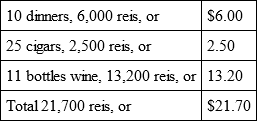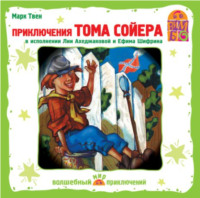 полная версия
полная версияThe Innocents Abroad
We saw the usual sharks, blackfish, porpoises, etc., of course, and by and by large schools of Portuguese men-of-war were added to the regular list of sea wonders. Some of them were white and some of a brilliant carmine color. The nautilus is nothing but a transparent web of jelly that spreads itself to catch the wind, and has fleshy-looking strings a foot or two long dangling from it to keep it steady in the water. It is an accomplished sailor and has good sailor judgment. It reefs its sail when a storm threatens or the wind blows pretty hard, and furls it entirely and goes down when a gale blows. Ordinarily it keeps its sail wet and in good sailing order by turning over and dipping it in the water for a moment. Seamen say the nautilus is only found in these waters between the 35th and 45th parallels of latitude.
At three o’clock on the morning of the twenty-first of June, we were awakened and notified that the Azores islands were in sight. I said I did not take any interest in islands at three o’clock in the morning. But another persecutor came, and then another and another, and finally believing that the general enthusiasm would permit no one to slumber in peace, I got up and went sleepily on deck. It was five and a half o’clock now, and a raw, blustering morning. The passengers were huddled about the smoke-stacks and fortified behind ventilators, and all were wrapped in wintry costumes and looking sleepy and unhappy in the pitiless gale and the drenching spray.
The island in sight was Flores. It seemed only a mountain of mud standing up out of the dull mists of the sea. But as we bore down upon it the sun came out and made it a beautiful picture – a mass of green farms and meadows that swelled up to a height of fifteen hundred feet and mingled its upper outlines with the clouds. It was ribbed with sharp, steep ridges and cloven with narrow canyons, and here and there on the heights, rocky upheavals shaped themselves into mimic battlements and castles; and out of rifted clouds came broad shafts of sunlight, that painted summit, and slope and glen, with bands of fire, and left belts of somber shade between. It was the aurora borealis of the frozen pole exiled to a summer land!
We skirted around two-thirds of the island, four miles from shore, and all the opera glasses in the ship were called into requisition to settle disputes as to whether mossy spots on the uplands were groves of trees or groves of weeds, or whether the white villages down by the sea were really villages or only the clustering tombstones of cemeteries. Finally we stood to sea and bore away for San Miguel, and Flores shortly became a dome of mud again and sank down among the mists, and disappeared. But to many a seasick passenger it was good to see the green hills again, and all were more cheerful after this episode than anybody could have expected them to be, considering how sinfully early they had gotten up.
But we had to change our purpose about San Miguel, for a storm came up about noon that so tossed and pitched the vessel that common sense dictated a run for shelter. Therefore we steered for the nearest island of the group – Fayal (the people there pronounce it Fy-all, and put the accent on the first syllable). We anchored in the open roadstead of Horta, half a mile from the shore. The town has eight thousand to ten thousand inhabitants. Its snow-white houses nestle cosily in a sea of fresh green vegetation, and no village could look prettier or more attractive. It sits in the lap of an amphitheater of hills which are three hundred to seven hundred feet high, and carefully cultivated clear to their summits – not a foot of soil left idle. Every farm and every acre is cut up into little square inclosures by stone walls, whose duty it is to protect the growing products from the destructive gales that blow there. These hundreds of green squares, marked by their black lava walls, make the hills look like vast checkerboards.
The islands belong to Portugal, and everything in Fayal has Portuguese characteristics about it. But more of that anon. A swarm of swarthy, noisy, lying, shoulder-shrugging, gesticulating Portuguese boatmen, with brass rings in their ears and fraud in their hearts, climbed the ship’s sides, and various parties of us contracted with them to take us ashore at so much a head, silver coin of any country. We landed under the walls of a little fort, armed with batteries of twelve-and-thirty-two-pounders, which Horta considered a most formidable institution, but if we were ever to get after it with one of our turreted monitors, they would have to move it out in the country if they wanted it where they could go and find it again when they needed it. The group on the pier was a rusty one – men and women, and boys and girls, all ragged and barefoot, uncombed and unclean, and by instinct, education, and profession beggars. They trooped after us, and never more while we tarried in Fayal did we get rid of them. We walked up the middle of the principal street, and these vermin surrounded us on all sides and glared upon us; and every moment excited couples shot ahead of the procession to get a good look back, just as village boys do when they accompany the elephant on his advertising trip from street to street. It was very flattering to me to be part of the material for such a sensation. Here and there in the doorways we saw women with fashionable Portuguese hoods on. This hood is of thick blue cloth, attached to a cloak of the same stuff, and is a marvel of ugliness. It stands up high and spreads far abroad, and is unfathomably deep. It fits like a circus tent, and a woman’s head is hidden away in it like the man’s who prompts the singers from his tin shed in the stage of an opera. There is no particle of trimming about this monstrous capote, as they call it – it is just a plain, ugly dead-blue mass of sail, and a woman can’t go within eight points of the wind with one of them on; she has to go before the wind or not at all. The general style of the capote is the same in all the islands, and will remain so for the next ten thousand years, but each island shapes its capotes just enough differently from the others to enable an observer to tell at a glance what particular island a lady hails from.
The Portuguese pennies, or reis (pronounced rays), are prodigious. It takes one thousand reis to make a dollar, and all financial estimates are made in reis. We did not know this until after we had found it out through Blucher. Blucher said he was so happy and so grateful to be on solid land once more that he wanted to give a feast – said he had heard it was a cheap land, and he was bound to have a grand banquet. He invited nine of us, and we ate an excellent dinner at the principal hotel. In the midst of the jollity produced by good cigars, good wine, and passable anecdotes, the landlord presented his bill. Blucher glanced at it and his countenance fell. He took another look to assure himself that his senses had not deceived him and then read the items aloud, in a faltering voice, while the roses in his cheeks turned to ashes:
“‘Ten dinners, at 600 reis, 6,000 reis!’ Ruin and desolation!
“‘Twenty-five cigars, at 100 reis, 2,500 reis!’ Oh, my sainted mother!
“‘Eleven bottles of wine, at 1,200 reis, 13,200 reis!’ Be with us all!
“‘TOTAL, TWENTY-ONE THOUSAND SEVEN HUNDRED REIS!’ The suffering Moses! There ain’t money enough in the ship to pay that bill! Go – leave me to my misery, boys, I am a ruined community."
I think it was the blankest-looking party I ever saw. Nobody could say a word. It was as if every soul had been stricken dumb. Wine glasses descended slowly to the table, their contents untasted. Cigars dropped unnoticed from nerveless fingers. Each man sought his neighbor’s eye, but found in it no ray of hope, no encouragement. At last the fearful silence was broken. The shadow of a desperate resolve settled upon Blucher’s countenance like a cloud, and he rose up and said:
“Landlord, this is a low, mean swindle, and I’ll never, never stand it. Here’s a hundred and fifty dollars, Sir, and it’s all you’ll get – I’ll swim in blood before I’ll pay a cent more.”
Our spirits rose and the landlord’s fell – at least we thought so; he was confused, at any rate, notwithstanding he had not understood a word that had been said. He glanced from the little pile of gold pieces to Blucher several times and then went out. He must have visited an American, for when he returned, he brought back his bill translated into a language that a Christian could understand – thus:

Happiness reigned once more in Blucher’s dinner party. More refreshments were ordered.
CHAPTER VI
I think the Azores must be very little known in America. Out of our whole ship’s company there was not a solitary individual who knew anything whatever about them. Some of the party, well read concerning most other lands, had no other information about the Azores than that they were a group of nine or ten small islands far out in the Atlantic, something more than halfway between New York and Gibraltar. That was all. These considerations move me to put in a paragraph of dry facts just here.
The community is eminently Portuguese – that is to say, it is slow, poor, shiftless, sleepy, and lazy. There is a civil governor, appointed by the King of Portugal, and also a military governor, who can assume supreme control and suspend the civil government at his pleasure. The islands contain a population of about 200,000, almost entirely Portuguese. Everything is staid and settled, for the country was one hundred years old when Columbus discovered America. The principal crop is corn, and they raise it and grind it just as their great-great-great-grandfathers did. They plow with a board slightly shod with iron; their trifling little harrows are drawn by men and women; small windmills grind the corn, ten bushels a day, and there is one assistant superintendent to feed the mill and a general superintendent to stand by and keep him from going to sleep. When the wind changes they hitch on some donkeys and actually turn the whole upper half of the mill around until the sails are in proper position, instead of fixing the concern so that the sails could be moved instead of the mill. Oxen tread the wheat from the ear, after the fashion prevalent in the time of Methuselah. There is not a wheelbarrow in the land – they carry everything on their heads, or on donkeys, or in a wicker-bodied cart, whose wheels are solid blocks of wood and whose axles turn with the wheel. There is not a modern plow in the islands or a threshing machine. All attempts to introduce them have failed. The good Catholic Portuguese crossed himself and prayed God to shield him from all blasphemous desire to know more than his father did before him. The climate is mild; they never have snow or ice, and I saw no chimneys in the town. The donkeys and the men, women, and children of a family all eat and sleep in the same room, and are unclean, are ravaged by vermin, and are truly happy. The people lie, and cheat the stranger, and are desperately ignorant, and have hardly any reverence for their dead. The latter trait shows how little better they are than the donkeys they eat and sleep with. The only well-dressed Portuguese in the camp are the half a dozen well-to-do families, the Jesuit priests, and the soldiers of the little garrison. The wages of a laborer are twenty to twenty-four cents a day, and those of a good mechanic about twice as much. They count it in reis at a thousand to the dollar, and this makes them rich and contented. Fine grapes used to grow in the islands, and an excellent wine was made and exported. But a disease killed all the vines fifteen years ago, and since that time no wine has been made. The islands being wholly of volcanic origin, the soil is necessarily very rich. Nearly every foot of ground is under cultivation, and two or three crops a year of each article are produced, but nothing is exported save a few oranges – chiefly to England. Nobody comes here, and nobody goes away. News is a thing unknown in Fayal. A thirst for it is a passion equally unknown. A Portuguese of average intelligence inquired if our civil war was over. Because, he said, somebody had told him it was – or at least it ran in his mind that somebody had told him something like that! And when a passenger gave an officer of the garrison copies of the Tribune, the Herald, and Times, he was surprised to find later news in them from Lisbon than he had just received by the little monthly steamer. He was told that it came by cable. He said he knew they had tried to lay a cable ten years ago, but it had been in his mind somehow that they hadn’t succeeded!
It is in communities like this that Jesuit humbuggery flourishes. We visited a Jesuit cathedral nearly two hundred years old and found in it a piece of the veritable cross upon which our Saviour was crucified. It was polished and hard, and in as excellent a state of preservation as if the dread tragedy on Calvary had occurred yesterday instead of eighteen centuries ago. But these confiding people believe in that piece of wood unhesitatingly.
In a chapel of the cathedral is an altar with facings of solid silver – at least they call it so, and I think myself it would go a couple of hundred to the ton (to speak after the fashion of the silver miners) – and before it is kept forever burning a small lamp. A devout lady who died, left money and contracted for unlimited masses for the repose of her soul, and also stipulated that this lamp should be kept lighted always, day and night. She did all this before she died, you understand. It is a very small lamp and a very dim one, and it could not work her much damage, I think, if it went out altogether.
The great altar of the cathedral and also three or four minor ones are a perfect mass of gilt gimcracks and gingerbread. And they have a swarm of rusty, dusty, battered apostles standing around the filagree work, some on one leg and some with one eye out but a gamey look in the other, and some with two or three fingers gone, and some with not enough nose left to blow – all of them crippled and discouraged, and fitter subjects for the hospital than the cathedral.
The walls of the chancel are of porcelain, all pictured over with figures of almost life size, very elegantly wrought and dressed in the fanciful costumes of two centuries ago. The design was a history of something or somebody, but none of us were learned enough to read the story. The old father, reposing under a stone close by, dated 1686, might have told us if he could have risen. But he didn’t.
As we came down through the town we encountered a squad of little donkeys ready saddled for use. The saddles were peculiar, to say the least. They consisted of a sort of saw-buck with a small mattress on it, and this furniture covered about half the donkey. There were no stirrups, but really such supports were not needed – to use such a saddle was the next thing to riding a dinner table – there was ample support clear out to one’s knee joints. A pack of ragged Portuguese muleteers crowded around us, offering their beasts at half a dollar an hour – more rascality to the stranger, for the market price is sixteen cents. Half a dozen of us mounted the ungainly affairs and submitted to the indignity of making a ridiculous spectacle of ourselves through the principal streets of a town of 10,000 inhabitants.
We started. It was not a trot, a gallop, or a canter, but a stampede, and made up of all possible or conceivable gaits. No spurs were necessary. There was a muleteer to every donkey and a dozen volunteers beside, and they banged the donkeys with their goad sticks, and pricked them with their spikes, and shouted something that sounded like “Sekki-yah!” and kept up a din and a racket that was worse than Bedlam itself. These rascals were all on foot, but no matter, they were always up to time – they can outrun and outlast a donkey. Altogether, ours was a lively and a picturesque procession, and drew crowded audiences to the balconies wherever we went.
Blucher could do nothing at all with his donkey. The beast scampered zigzag across the road and the others ran into him; he scraped Blucher against carts and the corners of houses; the road was fenced in with high stone walls, and the donkey gave him a polishing first on one side and then on the other, but never once took the middle; he finally came to the house he was born in and darted into the parlor, scraping Blucher off at the doorway. After remounting, Blucher said to the muleteer, “Now, that’s enough, you know; you go slow hereafter.”
But the fellow knew no English and did not understand, so he simply said, “Sekki-yah!” and the donkey was off again like a shot. He turned a corner suddenly, and Blucher went over his head. And, to speak truly, every mule stumbled over the two, and the whole cavalcade was piled up in a heap. No harm done. A fall from one of those donkeys is of little more consequence than rolling off a sofa. The donkeys all stood still after the catastrophe and waited for their dismembered saddles to be patched up and put on by the noisy muleteers. Blucher was pretty angry and wanted to swear, but every time he opened his mouth his animal did so also and let off a series of brays that drowned all other sounds.
It was fun, scurrying around the breezy hills and through the beautiful canyons. There was that rare thing, novelty, about it; it was a fresh, new, exhilarating sensation, this donkey riding, and worth a hundred worn and threadbare home pleasures.
The roads were a wonder, and well they might be. Here was an island with only a handful of people in it – 25,000 – and yet such fine roads do not exist in the United States outside of Central Park. Everywhere you go, in any direction, you find either a hard, smooth, level thoroughfare, just sprinkled with black lava sand, and bordered with little gutters neatly paved with small smooth pebbles, or compactly paved ones like Broadway. They talk much of the Russ pavement in New York, and call it a new invention – yet here they have been using it in this remote little isle of the sea for two hundred years! Every street in Horta is handsomely paved with the heavy Russ blocks, and the surface is neat and true as a floor – not marred by holes like Broadway. And every road is fenced in by tall, solid lava walls, which will last a thousand years in this land where frost is unknown. They are very thick, and are often plastered and whitewashed and capped with projecting slabs of cut stone. Trees from gardens above hang their swaying tendrils down, and contrast their bright green with the whitewash or the black lava of the walls and make them beautiful. The trees and vines stretch across these narrow roadways sometimes and so shut out the sun that you seem to be riding through a tunnel. The pavements, the roads, and the bridges are all government work.
The bridges are of a single span – a single arch – of cut stone, without a support, and paved on top with flags of lava and ornamental pebblework. Everywhere are walls, walls, walls, and all of them tasteful and handsome – and eternally substantial; and everywhere are those marvelous pavements, so neat, so smooth, and so indestructible. And if ever roads and streets and the outsides of houses were perfectly free from any sign or semblance of dirt, or dust, or mud, or uncleanliness of any kind, it is Horta, it is Fayal. The lower classes of the people, in their persons and their domiciles, are not clean – but there it stops – the town and the island are miracles of cleanliness.
We arrived home again finally, after a ten-mile excursion, and the irrepressible muleteers scampered at our heels through the main street, goading the donkeys, shouting the everlasting “Sekki-yah,” and singing “John Brown’s Body” in ruinous English.
When we were dismounted and it came to settling, the shouting and jawing and swearing and quarreling among the muleteers and with us was nearly deafening. One fellow would demand a dollar an hour for the use of his donkey; another claimed half a dollar for pricking him up, another a quarter for helping in that service, and about fourteen guides presented bills for showing us the way through the town and its environs; and every vagrant of them was more vociferous, and more vehement and more frantic in gesture than his neighbor. We paid one guide and paid for one muleteer to each donkey.
The mountains on some of the islands are very high. We sailed along the shore of the island of Pico, under a stately green pyramid that rose up with one unbroken sweep from our very feet to an altitude of 7,613 feet, and thrust its summit above the white clouds like an island adrift in a fog!
We got plenty of fresh oranges, lemons, figs, apricots, etc., in these Azores, of course. But I will desist. I am not here to write Patent Office reports.
We are on our way to Gibraltar, and shall reach there five or six days out from the Azores.
CHAPTER VII
A week of buffeting a tempestuous and relentless sea; a week of seasickness and deserted cabins; of lonely quarterdecks drenched with spray – spray so ambitious that it even coated the smokestacks thick with a white crust of salt to their very tops; a week of shivering in the shelter of the lifeboats and deckhouses by day and blowing suffocating “clouds” and boisterously performing at dominoes in the smoking room at night.
And the last night of the seven was the stormiest of all. There was no thunder, no noise but the pounding bows of the ship, the keen whistling of the gale through the cordage, and the rush of the seething waters. But the vessel climbed aloft as if she would climb to heaven – then paused an instant that seemed a century and plunged headlong down again, as from a precipice. The sheeted sprays drenched the decks like rain. The blackness of darkness was everywhere. At long intervals a flash of lightning clove it with a quivering line of fire that revealed a heaving world of water where was nothing before, kindled the dusky cordage to glittering silver, and lit up the faces of the men with a ghastly luster!
Fear drove many on deck that were used to avoiding the night winds and the spray. Some thought the vessel could not live through the night, and it seemed less dreadful to stand out in the midst of the wild tempest and see the peril that threatened than to be shut up in the sepulchral cabins, under the dim lamps, and imagine the horrors that were abroad on the ocean. And once out – once where they could see the ship struggling in the strong grasp of the storm – once where they could hear the shriek of the winds and face the driving spray and look out upon the majestic picture the lightnings disclosed, they were prisoners to a fierce fascination they could not resist, and so remained. It was a wild night – and a very, very long one.
Everybody was sent scampering to the deck at seven o’clock this lovely morning of the thirtieth of June with the glad news that land was in sight! It was a rare thing and a joyful, to see all the ship’s family abroad once more, albeit the happiness that sat upon every countenance could only partly conceal the ravages which that long siege of storms had wrought there. But dull eyes soon sparkled with pleasure, pallid cheeks flushed again, and frames weakened by sickness gathered new life from the quickening influences of the bright, fresh morning. Yea, and from a still more potent influence: the worn castaways were to see the blessed land again! – and to see it was to bring back that motherland that was in all their thoughts.
Within the hour we were fairly within the Straits of Gibraltar, the tall yellow-splotched hills of Africa on our right, with their bases veiled in a blue haze and their summits swathed in clouds – the same being according to Scripture, which says that “clouds and darkness are over the land.” The words were spoken of this particular portion of Africa, I believe. On our left were the granite-ribbed domes of old Spain. The strait is only thirteen miles wide in its narrowest part.
At short intervals along the Spanish shore were quaint-looking old stone towers – Moorish, we thought – but learned better afterwards. In former times the Morocco rascals used to coast along the Spanish Main in their boats till a safe opportunity seemed to present itself, and then dart in and capture a Spanish village and carry off all the pretty women they could find. It was a pleasant business, and was very popular. The Spaniards built these watchtowers on the hills to enable them to keep a sharper lookout on the Moroccan speculators.









